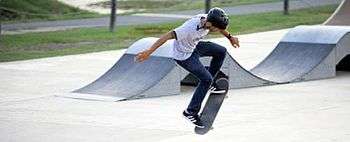Skateboarding trick

A skateboarding trick, or simply a trick, is a maneuver performed on a skateboard while skateboarding. Skateboarding tricks may vary greatly in difficulty.
History
Though skateboards emerged in the 1940s, skateboarding tricks like the ones done today did not appear until decades later. In the 1970s and earlier, the most common tricks were "2D" freestyle types such as wheelies, manuals, and pivots. Only later in the 1970s and early 1980s were common modern-day tricks like the ollie and kickflip invented by Alan “Ollie” Gelfand and Rodney Mullen, setting the stage for other aerial tricks.[1]
Types
Ollie
An Ollie is a jump where the front wheels leave the ground first.[2] This motion is attained with a snap of the tail (from the backfoot) and sliding your front-foot forward to reach any altitude. A lot of technical tricks transpire from this element (e.g. the kickflip, heelflip, 360-flip). A nollie is when the back wheels leave the ground first, or relatively, it's a switch-stance ollie riding fakie.
Indy Grab
An Indy Grab involves floating in the air, while either using a hand to hold the board against the feet or keeping constant and careful pressure on the board with the feet to keep it from floating away. Indy Grab usually combine rotation with different grabs. This class of tricks was first popularized when Tony Hawk became famous for his frontside airs in empty swimming pools in the late 1970s and has expanded to include the bulk of skateboarding tricks to this day, including the ollie and all of its variations.[3] The 900 and 1080[4] fall under the class of aerials, though these are commonly confused with aerial grabs.
Flip tricks
Flip tricks are a subset of aerials which are all based on the ollie. An example is the kickflip, the most widely known and performed flip trick. The board can be spun around many different axes as part of a flip trick, thus combining several rotations into one trick. These tricks are undoubtedly most popular among street skateboarding purists, although skaters with other styles perform them as well. Combining spins and flips is extremely popular in today's culture. A common trick in skateboarding lines is a 360 flip, or tre flip. A 360 flip is the combination of a skateboard spinning 360 degrees and a kickflip. There are also double kickflips and triple kickflips which are very difficult but highly regarded in the skateboarding culture.
Freestyle
Freestyle skateboarding tricks are tricks specifically associated with freestyle skateboarding.
Slides and grinds
Slides and grinds involve getting the board up on some type of ledge, rail, or coping and sliding or grinding along the board or trucks, respectively. When it is primarily the board which is contacting the edge, it's called a slide; when it's the truck, it is a grind. Grinding and sliding skateboards started with sliding the board on parking blocks and curbs, then extended to using the coping on swimming pools, then stairway handrails, and has now been expanded to include almost every possible type of edge.
Lip tricks
Lip tricks are done on the coping of a pool or skateboard ramp. Most grinds can be done on the coping of a ramp or pool as well, but there are some coping tricks which require the momentum and vertical attitude that can only be attained on a transitioned riding surface. These include inverts and their variations as well as some dedicated air-to-lip combinations.[5]
References
- ↑ Florez, Alex. "History of Skateboarding Tricks". Shreddit. Retrieved 6 March 2016.
- ↑ "Ollie - Definition". Merriam-Webster. Retrieved 7 October 2012.
- ↑ Skateboarder magazine, July, 1978
- ↑ "12 year old lands the first ever 1080 on a skateboard". Skateboarding.com.au. 3 July 2012. Retrieved 7 October 2012.
- ↑ "Useful Basic Tricks for Beginner Skaters". shralpin. Retrieved 21 July 2016.